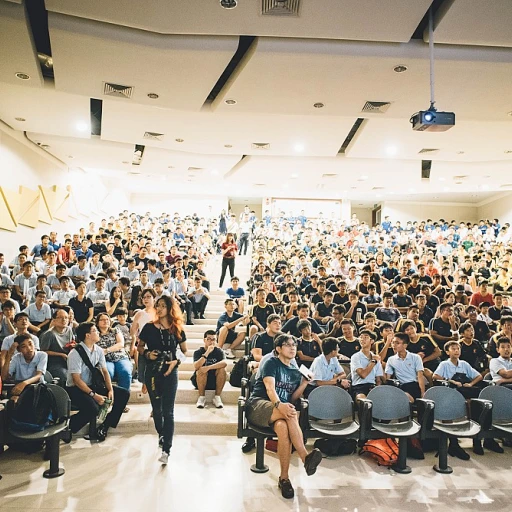
Defining human resources and talent advisor roles
Breaking Down the Core Functions
To understand the distinction between human resources and talent advisors within an organization, it's important to first delineate the roles each plays in the company structure. Both positions are integral to the hiring process, ensuring the seamless acquisition of qualified candidates who meet a business's needs. Human resources departments historically oversee a wide range of responsibilities related to employee management. This includes everything from handling recruitment and hiring to maintaining employee records, managing benefits, and ensuring regulatory compliance. They serve as a crucial business partner in resource management, supporting the overall organizational goals and addressing any employee-related concerns. On the other hand, talent advisors, sometimes seen as an evolution or specialization within the human resource spectrum, focus more directly on talent management and acquisition. They work closely with hiring managers to attract and retain top talent, placing emphasis on strategic recruitment tactics and personalized candidate experiences. Talent advisors bridge the gap between talent acquisition and management, ensuring a long-term fit between candidates and the company's cultural and strategic objectives. Their role requires deep insights into the job market and a nuanced understanding of what top talent seeks in prospective employers, allowing them to fine-tune the hiring process. Understanding these differences not only clarifies how these roles function within a business but highlights their unique value in enhancing efficiency in HR management. This distinction becomes even more apparent when considering the technological advancements shaping these fields as we'll explore in the further sections.Key skills and competencies
Essential Abilities Needed for HR and Talent Advisors
Understanding the different roles of a human resources professional and a talent advisor can be quite enlightening, especially when you start delving into the skills each one brings to the table. These roles, though interconnected, require a diverse set of competencies to effectively manage and support an organization’s workforce. Key Competencies for Human Resources Professionals:- Resource Management: The ability to allocate the right employees to the right jobs, ensuring the company runs smoothly.
- Employee Relations: Building and maintaining positive interactions between employees and the company.
- Compliance Expertise: Ensuring the organization adheres to labor laws and regulations.
- Problem-Solving: Addressing conflicts and employee-related issues promptly and effectively.
- Talent Acquisition: Identifying and attracting top talent to fill critical roles within the organization.
- Relationship Building: Establishing trust and connections with potential candidates throughout the hiring process.
- Market Insights: Understanding trends within the job market to strategically attract candidates.
- Social Media Savvy: Leveraging platforms to engage potential candidates and showcase company culture.
Impact on organizational culture
Influencing Organizational Culture
Organizational culture plays a crucial role in shaping the employee experience and can have a significant impact on a company's success. Human resources and talent advisors each contribute uniquely to fostering a positive work environment, though their approaches differ. Human resources departments are typically tasked with policy enforcement, employee relations, and maintaining a cohesive workforce. This foundational role ensures that the workplace operates smoothly, and employees feel supported in their roles.
Conversely, talent advisors adopt a more strategic approach by focusing on talent management and acquisition. Their emphasis on attracting and retaining top talent influences the long-term culture of an organization by bringing in individuals whose values align with those of the company. This alignment between candidates and company values can lead to a more motivated and engaged workforce.
Additionally, talent advisors often leverage social media and modern recruitment tools to engage potential candidates, promoting a culture of innovation and adaptation to new technologies within the organization. The recruitment process is not just about filling roles; it's about finding and nurturing qualified candidates who can drive the organization forward.
By balancing the operational roles of human resources and the strategic insights of talent advisors, companies can cultivate a healthy work culture that embraces diversity, inclusion, and continuous improvement. This balance is essential in today’s competitive job market, where the difference between what your organization offers and what other competitors provide can be the deciding factor for potential candidates.
Explore more on how organizational behavior and workplace dynamics impact these roles by visiting this detailed analysis.
Technology's role in evolving these positions
How Technology is Reshaping the Role of Human Resources and Talent Advisors
The rise of advanced technology is significantly transforming the fields of human resources and talent advising, impacting everything from talent acquisition to employee management. With the integration of data-driven tools and artificial intelligence, organizations are optimizing the hiring process by identifying more qualified candidates and predicting their fit in a company culture. These tools aid in the talent acquisition process by automating repetitive tasks, such as screening resumes and scheduling interviews, freeing up human resource professionals to focus on strategic planning. Moreover, social media platforms are increasingly leveraged as part of the recruitment process, allowing companies to engage with potential candidates and promote their employer brand. Human resource departments and talent advisors can utilize analytics to assess the effectiveness of their recruitment strategies and make informed decisions about where to allocate resources for maximum impact. The difference between traditional human resource roles and talent advisor positions is accentuated by this technological evolution. Talent advisors adapt quicker to new tech innovations to streamline talent management processes and ensure the organization capitalizes on top talent. Technology's role in these positions is not confined to recruitment alone. Employee management has evolved with HR technology, providing tools for performance evaluation, professional development, and employee satisfaction. Businesses are increasingly turning to software solutions that support resource management efforts, encouraging a more dynamic, long-term approach to employee growth. While the adoption of technology brings multiple benefits, it requires human resource teams and talent advisors to cultivate new skills, including data analysis and familiarity with tech platforms. As technology continues to evolve, the success of these roles will hinge on the ability of organizations to adapt and nurture a more sophisticated, tech-enabled approach to resource management.Challenges faced by human resources and talent advisors
Overcoming Hurdles: Challenges in Human Resources and Talent Advising
In today's fast-paced business environment, human resources (HR) professionals and talent advisors are tasked with navigating complex challenges that impact their ability to effectively manage and acquire talent. Key obstacles often stem from an evolving job market, digital transformation, and shifting employee expectations.- Dynamic Job Market: One of the most significant challenges faced by HR and talent advisors is the dynamic nature of the job market. As industries evolve, so do the skills and competencies required for various roles. This shift necessitates a proactive approach in talent acquisition and management, as organizations strive to fill roles with highly qualified candidates.
- Technological Advancements: While technology plays a vital role in evolving HR and talent advisor positions, it also presents its challenges. The integration of new technologies can disrupt existing processes, requiring both HR and talent advisors to constantly adapt and update their strategies. This often involves leveraging social media and other digital tools to enhance the hiring process and engage potential candidates effectively.
- Employee Expectations: Today’s employees, especially top talent, have higher expectations regarding workplace culture and job satisfaction. Companies must, therefore, create an environment that attracts and retains talent. This includes implementing resource management practices that align with long-term business goals and employee values.
- Complex Recruitment Processes: Recruitment can be a cumbersome process, with HR and talent advisors often working closely with hiring managers to streamline operations. The difference between effective and ineffective recruitment often lies in the ability to identify and engage with the right candidates quickly, ensuring the organization's continued growth and success.
Future trends in human resources and talent advising
Emerging Trends Shaping the Future
The landscape of human resources and talent advising is rapidly evolving, driven by technological advancements and changing workforce dynamics. As organizations strive to attract and retain top talent, several trends are emerging that will shape the future of these roles.
Increased Reliance on Data Analytics
Data analytics is becoming a cornerstone in talent management and acquisition. Human resources professionals and talent advisors are leveraging data to make informed decisions about hiring, employee engagement, and retention strategies. By analyzing patterns and trends, companies can better understand their workforce and tailor their approaches to meet the needs of both the organization and its employees.
Emphasis on Employee Experience
Organizations are increasingly focusing on enhancing the employee experience to improve job satisfaction and retention. This involves creating a positive work environment, offering professional development opportunities, and ensuring a healthy work-life balance. Talent advisors play a crucial role in shaping these experiences by aligning company culture with employee expectations.
Adoption of AI and Automation
Artificial intelligence and automation are transforming the recruitment process. From sourcing potential candidates to screening resumes, AI tools are streamlining tasks that were once time-consuming for human resource teams. This allows hiring managers to focus on more strategic aspects of talent acquisition, such as building relationships with candidates and understanding their unique skills and potential contributions to the company.
Remote Work and Flexible Arrangements
The shift towards remote work and flexible job arrangements is another trend impacting human resources and talent advisors. As businesses adapt to these changes, they must develop strategies to manage remote teams effectively and maintain productivity. This includes utilizing technology to facilitate communication and collaboration among employees, regardless of their physical location.
Focus on Diversity and Inclusion
Diversity and inclusion are becoming integral components of organizational culture. Companies are recognizing the value of diverse perspectives and are actively working to create inclusive environments. Human resources and talent advisors are at the forefront of these efforts, implementing policies and practices that promote diversity in hiring and throughout the employee lifecycle.
As these trends continue to evolve, the roles of human resources and talent advisors will undoubtedly adapt to meet the changing needs of businesses and employees alike. Staying informed and agile will be key to navigating the future of talent management and acquisition.













